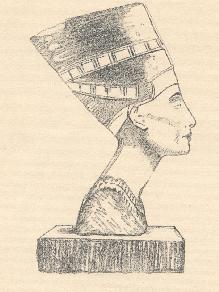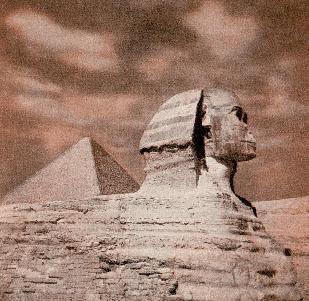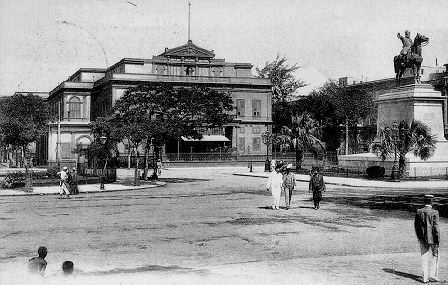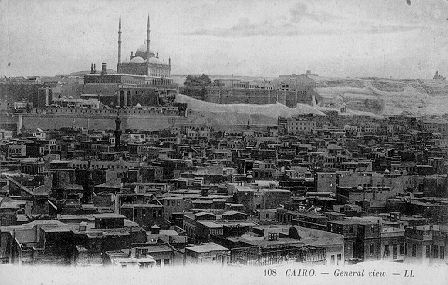
Books about Egypt are innumerable.
Her people, her history, her climate, her monuments, everything even remotely
connected with Egypt has been written of and discussed from every conceivable
point of view. The wealth of material, the abundance of its Bibliography
make it impossible for anyone person to study and assimilate it all. The
studies are alluring but life, alas ! is short. It is because there
is so much to see, see and learn about Egypt that this little book has
been written. Not that it aspires to supplant or replace any of the works
already existing, nor does it hope to give more than a brief glimpse of
Egypt's many aspects. It merely seeks to indicate some of them. For every
one of the studies on which it does no more than touch there are numerous
authorities whom the reader, should happily his interest be aroused, may
consult.
 There is Ancient Egypt, the cradle of mankind and civilisation. He who
turns his mind to this enthralling subject will find that he has strucka
mine of inexhaustible wealth. During the last century and a half scholars
from all over the world have devoted their lives to the science of Egyptology.
Champollion's discovery of the Rosetta Stone has made possible the deciphering
of hieroglyphics. New discoveries are made and fresh manuscripts deciphered
with every year that passes. It may well be that when, in retrospect, our
descendants look back on the twentieth century they will count among its
outstanding achievements the fact that it brought to light the tomb of
Tutankhamen and its contents, contents which will be to future ages, as
they are to our own, a source of never ending wonder and admiration.
There is Ancient Egypt, the cradle of mankind and civilisation. He who
turns his mind to this enthralling subject will find that he has strucka
mine of inexhaustible wealth. During the last century and a half scholars
from all over the world have devoted their lives to the science of Egyptology.
Champollion's discovery of the Rosetta Stone has made possible the deciphering
of hieroglyphics. New discoveries are made and fresh manuscripts deciphered
with every year that passes. It may well be that when, in retrospect, our
descendants look back on the twentieth century they will count among its
outstanding achievements the fact that it brought to light the tomb of
Tutankhamen and its contents, contents which will be to future ages, as
they are to our own, a source of never ending wonder and admiration.
 Yet although so much is known of Ancient Egypt, enough mystery and questioning
remain to make its study much more than a compilation of knowledge: there
is always the thrilling possibility that some new discovery may throw on
what is known, the light of further knowledge; there is always the hope
that out of that age-long past will emerge something fresh and unexpected.
To those who know and love Ancient Egypt the possibility is one which arouses
their eager anticipation. It is a stirring thought that our age may yet
discover something that, new today, was already old in the times of "the
glory that was Greece, the grander that was Rome".
Yet although so much is known of Ancient Egypt, enough mystery and questioning
remain to make its study much more than a compilation of knowledge: there
is always the thrilling possibility that some new discovery may throw on
what is known, the light of further knowledge; there is always the hope
that out of that age-long past will emerge something fresh and unexpected.
To those who know and love Ancient Egypt the possibility is one which arouses
their eager anticipation. It is a stirring thought that our age may yet
discover something that, new today, was already old in the times of "the
glory that was Greece, the grander that was Rome".
There is the Egypt of the Bible. To thousands
of people all over the world the name of Egypt is bound up ,vith
memories of earliest childhood when first they heard the well remembered
stories of Joseph and his brethren, of Moses in the bulrushes, of the ten
plagues, of the Exodus and of the flight into Egypt. They may recall the
Princess who went forth from Egypt to become the bride of King Solomon;
they may remember how, in childhood days they were puzzled by the
expression "making bricks without straw". The bricks and the straw may
still be seen in Egypt. Many of the Bible stories are commemorated in Egyptian-named
places, and, all over Egypt they are recited and sung in folk-lore, legend,
and folk-songs.

There is Egypt of the Middle Ages which,
in a sense is the Egypt of today since the inspiration of Islam is as strong
today as it was a thousand years ago. Egypt is in fact a centre of
Islam-"that noble monotheism"-for it is from her great university of Al-Azhar
that the teachers, the preachers, and theologians go out to all parts of
the Moslem world. From this fact and from the skill of her artists and
craftsmen arises Egypt's incomparable wealth of Islamic architecture and
art. Cairo, the city of a thousand mosques would attract the visitor from
afar even if she had Hi had nothing more to show than her mosques and other
Arab monuments. A fascinating aspect is that of modern Egypt. The growth
and development of what is fresh and young has always a charm of its.
Great as is the contrast between the Egypt of four thousand years ago and
that of today, the continuity is greater still. One has but to compare
the faces on ancient statues and bas-reliefs ,vith those of modern workers
in Egyptian fields to realise that accretions from other lands have been
assimilated by the race that wrought the Pyramids. It may be confidently
predicted that Modern Egypt, in adopting the progress and civilization
of the West, will assimilate and adapt to her own particular genius the
benefits of Western culture and skill ,vhile retaining the knowledge and
experience that are hers by inheritance and traditions.

The present age is one of
hurry, of speed and of congested spaces. To many therefore the lure of
Egypt lies in her vast stretches of lonely desert where, far from noise
and bustle, there is no company save that of the wind, the sun and the
stars. ,The changeless, silent desert is as it always was with the one
difference that it can no longer be described as trackless: solitude and
silence may be found in the Egyptian deserts but the way thereto has been
made easy and accessible to the traveller's motor car.'"
Mention of the desert raises the question of climate.
If a warm sun and a cloudless sky did not look down on its silent solitude
there would be no attraction about the desert. But in respect of climate
Egypt is indeed a favoured land. Her winter sunshine is one of the most
exhilarating known to man; the beauty of her moonlight, the glory of her
starlit sky are so well know as to need no more than a passing reference.
Even the heat of summer is seldom oppressive for the cool north breeze
blows practically every day. The virtues of Egypt as a climatic and
health resort have been known and appreciated for many centuries and her
sulphur waters at Helwan have marvellous curative effects in many cases
of serious illness. Snow is of course unknown in Egypt; rain is an infrequent
visitor; but every day brings much joy of sunlit warmth.

Egypt's climate is very naturally
a magnet to the invalid and the convalescent. It is also a lure to the
happy majority who enjoy full health and strength, for the equable temperature
and the constant sunlight make of Egypt an all-the-year centre for almost
every kind of sport.  Tennis,
football, cricket, polo and golf are, in Egypt practically independent
of weather conditions and the numerous and excellent sporting clubs which
have sprung up all over the country are an eloquent testimony to the popularity
which sport enjoys. Racing either in Cairo or Alexandria goes on for nearly
the whole of the year. Boating, fishing and swimming are always available
while excellent shooting may be had within a very short distance of the
main cities. Egypt, the lodestar of the archaeologist, is also the paradise
of the sportsman. - W have already said that Egypt in her many aspects
is worthy of more than one lifetime of study; but even a cursory acquaintance
with one of them is enough to arouse interest and, more often than not.
an abiding affection. If this little introduction should succeed
in arousing the desire for such acquaintance its aim and object will have
been amply fulfilled. Tennis,
football, cricket, polo and golf are, in Egypt practically independent
of weather conditions and the numerous and excellent sporting clubs which
have sprung up all over the country are an eloquent testimony to the popularity
which sport enjoys. Racing either in Cairo or Alexandria goes on for nearly
the whole of the year. Boating, fishing and swimming are always available
while excellent shooting may be had within a very short distance of the
main cities. Egypt, the lodestar of the archaeologist, is also the paradise
of the sportsman. - W have already said that Egypt in her many aspects
is worthy of more than one lifetime of study; but even a cursory acquaintance
with one of them is enough to arouse interest and, more often than not.
an abiding affection. If this little introduction should succeed
in arousing the desire for such acquaintance its aim and object will have
been amply fulfilled.
next |

 There is Ancient Egypt, the cradle of mankind and civilisation. He who
turns his mind to this enthralling subject will find that he has strucka
mine of inexhaustible wealth. During the last century and a half scholars
from all over the world have devoted their lives to the science of Egyptology.
Champollion's discovery of the Rosetta Stone has made possible the deciphering
of hieroglyphics. New discoveries are made and fresh manuscripts deciphered
with every year that passes. It may well be that when, in retrospect, our
descendants look back on the twentieth century they will count among its
outstanding achievements the fact that it brought to light the tomb of
Tutankhamen and its contents, contents which will be to future ages, as
they are to our own, a source of never ending wonder and admiration.
There is Ancient Egypt, the cradle of mankind and civilisation. He who
turns his mind to this enthralling subject will find that he has strucka
mine of inexhaustible wealth. During the last century and a half scholars
from all over the world have devoted their lives to the science of Egyptology.
Champollion's discovery of the Rosetta Stone has made possible the deciphering
of hieroglyphics. New discoveries are made and fresh manuscripts deciphered
with every year that passes. It may well be that when, in retrospect, our
descendants look back on the twentieth century they will count among its
outstanding achievements the fact that it brought to light the tomb of
Tutankhamen and its contents, contents which will be to future ages, as
they are to our own, a source of never ending wonder and admiration.
 Yet although so much is known of Ancient Egypt, enough mystery and questioning
remain to make its study much more than a compilation of knowledge: there
is always the thrilling possibility that some new discovery may throw on
what is known, the light of further knowledge; there is always the hope
that out of that age-long past will emerge something fresh and unexpected.
To those who know and love Ancient Egypt the possibility is one which arouses
their eager anticipation. It is a stirring thought that our age may yet
discover something that, new today, was already old in the times of "the
glory that was Greece, the grander that was Rome".
Yet although so much is known of Ancient Egypt, enough mystery and questioning
remain to make its study much more than a compilation of knowledge: there
is always the thrilling possibility that some new discovery may throw on
what is known, the light of further knowledge; there is always the hope
that out of that age-long past will emerge something fresh and unexpected.
To those who know and love Ancient Egypt the possibility is one which arouses
their eager anticipation. It is a stirring thought that our age may yet
discover something that, new today, was already old in the times of "the
glory that was Greece, the grander that was Rome".



 Tennis,
football, cricket, polo and golf are, in Egypt practically independent
of weather conditions and the numerous and excellent sporting clubs which
have sprung up all over the country are an eloquent testimony to the popularity
which sport enjoys. Racing either in Cairo or Alexandria goes on for nearly
the whole of the year. Boating, fishing and swimming are always available
while excellent shooting may be had within a very short distance of the
main cities. Egypt, the lodestar of the archaeologist, is also the paradise
of the sportsman. - W have already said that Egypt in her many aspects
is worthy of more than one lifetime of study; but even a cursory acquaintance
with one of them is enough to arouse interest and, more often than not.
an abiding affection. If this little introduction should succeed
in arousing the desire for such acquaintance its aim and object will have
been amply fulfilled.
Tennis,
football, cricket, polo and golf are, in Egypt practically independent
of weather conditions and the numerous and excellent sporting clubs which
have sprung up all over the country are an eloquent testimony to the popularity
which sport enjoys. Racing either in Cairo or Alexandria goes on for nearly
the whole of the year. Boating, fishing and swimming are always available
while excellent shooting may be had within a very short distance of the
main cities. Egypt, the lodestar of the archaeologist, is also the paradise
of the sportsman. - W have already said that Egypt in her many aspects
is worthy of more than one lifetime of study; but even a cursory acquaintance
with one of them is enough to arouse interest and, more often than not.
an abiding affection. If this little introduction should succeed
in arousing the desire for such acquaintance its aim and object will have
been amply fulfilled.